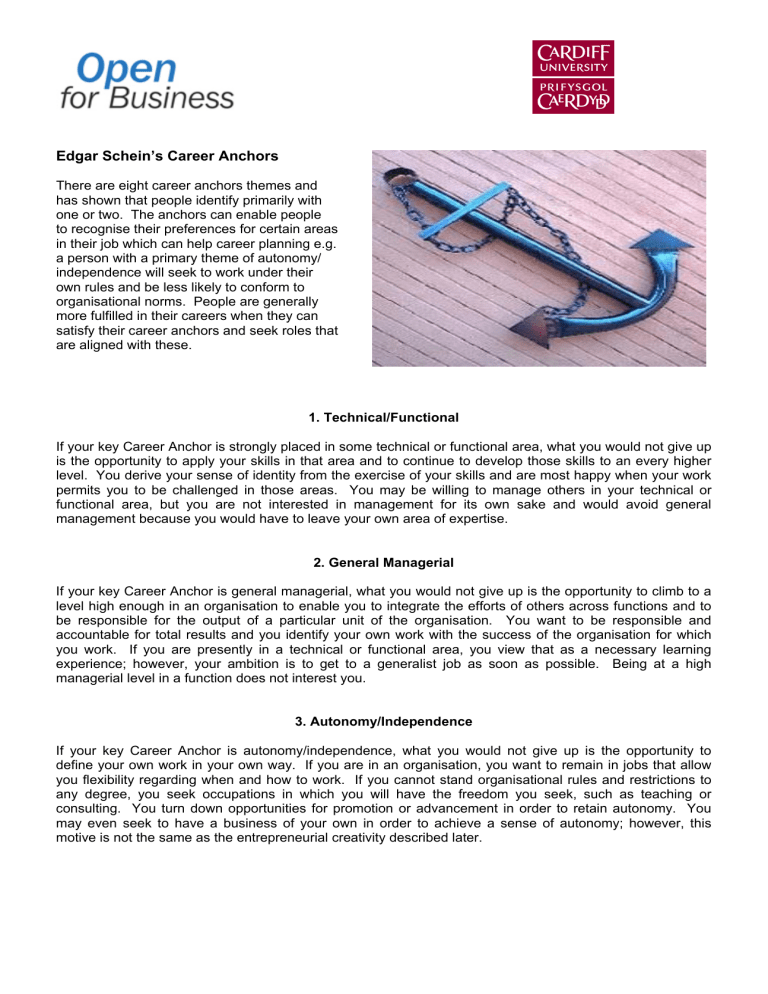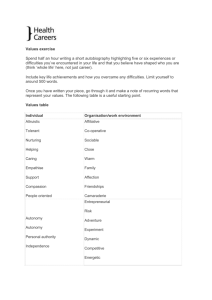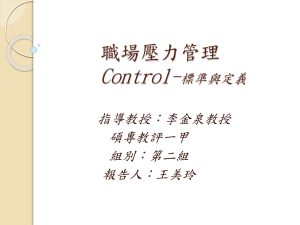
Edgar Schein’s Career Anchors There are eight career anchors themes and has shown that people identify primarily with one or two. The anchors can enable people to recognise their preferences for certain areas in their job which can help career planning e.g. a person with a primary theme of autonomy/ independence will seek to work under their own rules and be less likely to conform to organisational norms. People are generally more fulfilled in their careers when they can satisfy their career anchors and seek roles that are aligned with these. 1. Technical/Functional If your key Career Anchor is strongly placed in some technical or functional area, what you would not give up is the opportunity to apply your skills in that area and to continue to develop those skills to an every higher level. You derive your sense of identity from the exercise of your skills and are most happy when your work permits you to be challenged in those areas. You may be willing to manage others in your technical or functional area, but you are not interested in management for its own sake and would avoid general management because you would have to leave your own area of expertise. 2. General Managerial If your key Career Anchor is general managerial, what you would not give up is the opportunity to climb to a level high enough in an organisation to enable you to integrate the efforts of others across functions and to be responsible for the output of a particular unit of the organisation. You want to be responsible and accountable for total results and you identify your own work with the success of the organisation for which you work. If you are presently in a technical or functional area, you view that as a necessary learning experience; however, your ambition is to get to a generalist job as soon as possible. Being at a high managerial level in a function does not interest you. 3. Autonomy/Independence If your key Career Anchor is autonomy/independence, what you would not give up is the opportunity to define your own work in your own way. If you are in an organisation, you want to remain in jobs that allow you flexibility regarding when and how to work. If you cannot stand organisational rules and restrictions to any degree, you seek occupations in which you will have the freedom you seek, such as teaching or consulting. You turn down opportunities for promotion or advancement in order to retain autonomy. You may even seek to have a business of your own in order to achieve a sense of autonomy; however, this motive is not the same as the entrepreneurial creativity described later. 4. Security/Stability If your key Career Anchor is security/stability, what you would not give up is employment security or tenure in a job or organisation. You main concern is to achieve a sense of having succeeded so that you can relax. The value is illustrated by a concern for financial security (such as pension and retirement plans) or employment security. Such stability may involve trading your loyalty and willingness to do whatever the employer wants from you for some promise of job tenure. You are less concerned with the content of your work and the rank you achieve in the organisation, although you may achieve a high level if your talents permit. As with autonomy, everyone has certain needs for security and stability, especially at times when financial burdens may be heavy or when one is facing retirement. People biased in this way, however, are always concerned with these issues and build their entire self-images around the management of security and stability. 5. Entrepreneurial Creativity If your key Career Anchor is entrepreneurial creativity, what you would not give up is the opportunity to create an organisation or enterprise of your own, built on your own abilities and your willingness to take risks and to overcome obstacles. You want to prove to the world that you can create an enterprise that is the result of your own effort. You may be working for others in an organisation while you are learning and assessing future opportunities, but you will go out on your own as soon as you feel you can manage it. You want your enterprise to be financially successful as proof of your abilities. 6. Service/Dedication to a Cause If your key Career Anchor is service/dedication to a cause, what you would not give up is the opportunity to pursue work that achieves something of value, such as making the world a better place to live, solving environmental problems, improving harmony among people, helping others, improving people’s safety, curing diseases through new products and so on. You pursue such opportunities even if it means changing organisations, and you do not accept transfers or promotions that would take you out of work that fulfils those values. 7. Pure Challenge If your key Career Anchor is pure challenge, what you would not give up is the opportunity to work on solutions to seemingly unsolvable problems, to succeed over tough opponents, or to overcome difficult obstacles. For you, the only meaningful reason for pursuing a job or career is that it permits you to succeed in the fact of the impossible. Some people find such pure challenge in intellectual kinds of work, such as the engineer who is only interested in impossibly difficult designs; some find the challenge in complex, multifaceted situations, such as the strategy consultant who is only interested in clients who are about to go bankrupt and have exhausted all other resources; some find it in interpersonal competition, such as the professional athlete or the salesperson who defines every sale as either a win or a loss. Novelty, variety and difficulty become ends in themselves, and if something is easy, it becomes immediately boring. 8. Lifestyle If your key Career Anchor is lifestyle, what you would not give up is a situation that permits you to balance and integrate your personal needs, your family needs, and the requirements of your career. You want to make all of the major sectors of your life work together toward an integrated whole, and you therefore need a career situation that provides enough flexibility to achieve such integration. You may have to sacrifice some aspects of the career (for example, a geographical move that would be a promotion but would upset your total life situation), and you define success in terms broader than just career success. You feel that your identity is more tied up with how you live your total life, where you settle, how you deal with your family situation, and how you develop yourself than with any particular job or organisation. With the eight themes identified by Schein in mind, complete the related exercise [Career Anchors – how well do your values match your job?] to help you assess how well suited you are to your current job. By completing this activity, you may conclude that you are in the right sort of role or that you need a change if you are going to succeed in your desired career path. This may be a positive thing as it will give insight into your future goals and objectives.

